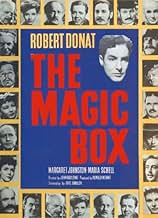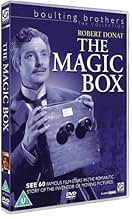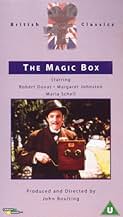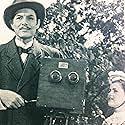IMDb RATING
7.0/10
1.5K
YOUR RATING
A chronicle of the life of William Friese-Greene, a British inventor and early pioneer in cinema.A chronicle of the life of William Friese-Greene, a British inventor and early pioneer in cinema.A chronicle of the life of William Friese-Greene, a British inventor and early pioneer in cinema.
- Nominated for 2 BAFTA Awards
- 1 win & 2 nominations total
Renée Asherson
- Miss Tagg
- (as Renee Asherson)
- Director
- Writers
- All cast & crew
- Production, box office & more at IMDbPro
Featured reviews
This is the 1951 feature made by the British film industry to celebrate the festival of Britain. The film stars a virtual who's who of all the famous British cinema actors of that time, and one of the fun things about this film is trying to identify all of them as they pop up in various cameo roles. The story is the biography of William Friese- Greene, who this film claims invented the motion picture camera and projector. Edison and Lumiere are casually acknowledged as also being motion picture pioneers, but Friese-Greene is claimed to have had the first intermittent mechanism (presumably the Maltese cross) used in today's cinema projectors. It also claims that he invented the biocolour process, where color motion pictures are produced by rotating two color filters in front of the camera and projector (KinemaColour). The lead role is beautifully played by Robert Donat as the quiet intense inventor obsessed with producing moving photographs, and his wife is competently played by Maria Schell. Also appearing in cameo roles are Michael Redgrave, Richard Attenborough, Peter Ustinov, Stanley Holloway, Michael Dennison, the great Dennis Price, the beautiful Glynnis Johns and her father Mervyn Johns, the eccentric Joyce Grenfell, the wonderful Margeret Rutherford, and a host of others too long to mention. The most famous cameo is by Sir Laurence Olivier, as the astonished policeman who witnesses Friese-Greene's first triumph, the projection of moving images of Hyde Park on an improvised sheet screen. This is the most remembered scene of the film, and Friese Greene's excitement at this event reminded me of my own excitement when I first turned the handle on my first Pathescope 9.5mm projector! The film is of great interest to film collectors and movie buffs, containing beautiful shots of old wood and brass magic lanterns and early movie equipment. There are many wonderful scenes, such as the Victorian photo studio where they show customers having to stand absolutely still for 30 seconds to get their photo taken! The film was produced by Roy Boulting, and the beautiful Victorian settings and costumes are sumptuously photographed by Jack Cardiff. My family and friends really enjoyed this movie, it is low key almost like a BBC period drama, but if you are a film collector you will love it. We take the showing of films in our homes for granted these days, and it easy to forget the real struggle by inventors such as Friese- Greene to achieve what seemed impossible at the time. American audiences will of course have to (at least temporarily) suspend their belief that Edison was the sole inventor of the motion picture camera ( in fact Edison was primarily a business man and entrepreneur who copied many of the motion picture concepts developed by Lumiere in France) This film is very rare indeed. I don't think it exists on VHS or DVD,(certainly not in the USA), however Super 8mm film prints do exist, so if you find an S8 print grab it! My particular super 8 print is a 2400 ft Agfa color print, pin sharp with beautiful rich colors and great contrast. The mono magnetic track sound quality is very good for a film of 1951 vintage. Highly recommended, if you can find it.
The most enjoyable and very emotional scene was when Robert Donat (Wm. Friese-Greene) finally succeeds in producing moving images on a sheet he's hung in his studio...he runs like a madman into the street in the middle of the night desperate to find someone to witness this miracle. Who does he find? Sir Laurence Olivier..a Police Constable . Donat ushers him into his lab, sits him down and proceeds to ramble on about what he's invented. Sir Laurence, the ever vigilant and cautious policeman thinks he's some kind of nut and slowly reaches for his night stick..that's when Robert Donat flicks on the first moving pictures of Hyde Park...Olivier is flabergasted..gets up moves to the sheet and looks behind it.."That's Hyde Park!' After rambling some more Robert Donat breaks into tears..finally explaining what he has accomplished..Olivier replies "You must be a very happy man"..a terrific scene and one I'll never forget. A cameo appearance by Lord Olivier and a very memorable scene.
The most notable aspect of this film is the enormous number of famous actors, some of whom I didn't notice but saw them on the cast list. Older viewers will enjoy looking out for them. The acting is therefore generally very good.
I have two main criticisms of the film. First, the story is shown out of sequence, and would have been just as good and less confusing if shown in the correct sequence. Secondly, it is not accurate, being a strange mixture of fact and fiction. For example, at one point he meets William Fox-Talbot, who died when Friese-Green was only 22! If a biographical book made such a claim it would be strongly criticised, but for some reason which I have never understood it is perfectly acceptable in the cinema.
So watch it purely for entertainment., but for biographical facts go to Wiki or elsewhere.
I have two main criticisms of the film. First, the story is shown out of sequence, and would have been just as good and less confusing if shown in the correct sequence. Secondly, it is not accurate, being a strange mixture of fact and fiction. For example, at one point he meets William Fox-Talbot, who died when Friese-Green was only 22! If a biographical book made such a claim it would be strongly criticised, but for some reason which I have never understood it is perfectly acceptable in the cinema.
So watch it purely for entertainment., but for biographical facts go to Wiki or elsewhere.
Whether or not William Friese-Greene was actually the father of motion pictures he was certainly in there trying. And though Edison and some French guys get a mention in passing this beautifully-mounted star-laden tribute to dogged endeavour is all Willie's show - made thirty years after his death and timed for the Festival of Britain. It almost missed the bus in this regard and wasn't generally released until the following year,something charmingly British about that. The film itself is charmingly British too, handling its huge cast and period detail with steady quietly-absorbing assurance. Eric Ambler's deftly-crafted script provides romance, comedy, poignancy and an absolutely splendid pinnacle-scene which sums the picture up both in terms of story and production-plan. His dual-flashback structure, which some find confusing, permits the masterly Robert Donat to re-wind from forgotten old codger to eager young whippersnapper and back again with a shift in the middle for 'changing reels' on the assertion of his second wife that "Willie was before my time". This second marriage assuaged his widower-loneliness and certainly produced quite a brood but was blighted by despondency - he's not mentioned in the Encyclopedia - and his ever-present financial incompetence which severs their union. It's the more distant past, the era of inspiration and achievement, which is the film's ultimate destination.
The cameo stars fall to with aplomb - 'The Play's the Thing, what would you like us to do ?' There's the fun of the Living Statues, Margaret Rutherford at her most formidable, wiping the floor with Mr. Guttenberg, Joan Hickson's cute scene-stealing as the customer with the facial twitch, Muir Mathieson appearing on-screen for once conducting the Bath Choral Society while the only solo male vocalist is miles away chinwagging forgetfully with the inventor of photography. Eric Portman bulldozes through as Willie's irascible business-partner and almost every trade and profession is represented along the way by a famous face - doctors, reporters, bank managers, estate agents, instrument-makers, pawnbrokers and company promoters - this last attributed in the credits to Roland Culver and Garry Marsh who do not appear in the release-prints. The BFI site solves the vexing question of the truncated version short by fifteen minutes which is now apparently the only one that survives. The most illustrious guest is fittingly the last to make an entrance - Olivier as the apprehensive bobby on the beat dragged in off the street by Willie to watch Hyde Park shimmering on a sheet. One of the great scenes in British cinema its magical blend of narrative-significance and emotional realism is in effect the movie's climax. The quibbling over technical inaccuracies here is irrelevant, it's not a documentary and as long as the audience gets the point the purpose is served. Maria Schell is enchanting as the first Mrs. Willie and Jack Cardiff - the Technicolor Kid - would have made our hero proud. It's the visionary labour of Willie and his contemporaries which has given us what we love. To correct another poster the last ironic line in the film after Willie's demise is spoken not by Dennis Price but by Michael Denison.
The cameo stars fall to with aplomb - 'The Play's the Thing, what would you like us to do ?' There's the fun of the Living Statues, Margaret Rutherford at her most formidable, wiping the floor with Mr. Guttenberg, Joan Hickson's cute scene-stealing as the customer with the facial twitch, Muir Mathieson appearing on-screen for once conducting the Bath Choral Society while the only solo male vocalist is miles away chinwagging forgetfully with the inventor of photography. Eric Portman bulldozes through as Willie's irascible business-partner and almost every trade and profession is represented along the way by a famous face - doctors, reporters, bank managers, estate agents, instrument-makers, pawnbrokers and company promoters - this last attributed in the credits to Roland Culver and Garry Marsh who do not appear in the release-prints. The BFI site solves the vexing question of the truncated version short by fifteen minutes which is now apparently the only one that survives. The most illustrious guest is fittingly the last to make an entrance - Olivier as the apprehensive bobby on the beat dragged in off the street by Willie to watch Hyde Park shimmering on a sheet. One of the great scenes in British cinema its magical blend of narrative-significance and emotional realism is in effect the movie's climax. The quibbling over technical inaccuracies here is irrelevant, it's not a documentary and as long as the audience gets the point the purpose is served. Maria Schell is enchanting as the first Mrs. Willie and Jack Cardiff - the Technicolor Kid - would have made our hero proud. It's the visionary labour of Willie and his contemporaries which has given us what we love. To correct another poster the last ironic line in the film after Willie's demise is spoken not by Dennis Price but by Michael Denison.
I'm sure it didn't hurt in the resolve of the British film industry to honor one of its pioneers and one who some claim to have been the actual inventor of motion pictures, William Friese-Greene, to have one of his grandchildren, Richard Greene as a film star in his own right. The Magic Box is a fine tribute to someone generally forgotten if known at all to American audiences especially.
Robert Donat brings his Mr. Chips character and weaves it into the character of William Friese-Greene. The story is told in flashback and in reverse order, first by his second wife Margaret Johnston from their first meeting in 1897 through their marriages and then later by Donat himself as he remembers his first wife Maria Schell. But in both remembrances, the thing that stands out is his driving obsession to capture movement on some medium. As Donat eloquently puts it, 'movement is life'.
It costs him dear, he does not get the credit he feels due him, it goes to that upstart Thomas Edison from the USA. Actually fellow Britishers George Alfred Smith and Charles Urban and Frenchmen Auguste and Louis Lumiere and Emile Reynaud all could claim pioneering contributions to the motion picture as well. Friese-Greene was a fine portrait photographer, but spent all his money on his experiments, even selling the patent he took out on his early motion picture camera.
Donat, Johnston and Schell are supported by a massive cast of the best British players doing small parts in tribute and belated recognition to the guy who now is considered if not THE inventor of motion pictures, the founder of British cinema. From Laurence Olivier in the role of an astonished policeman who is the first to see Robert Donat's breakthrough, to Bernard Miles as Donat's stuffy cousin who's worried about having the bite put on him, to young John Howard Davies as the youngest of Friese-Greene's sons, you'll recognize lots of familiar faces.
Still the film belongs to Donat as the obsessed, but touching Friese- Greene who helped give the world a universal medium of entertainment. Donat never gave a bad performance on the screen and Friese-Greene ranks among his best.
Robert Donat brings his Mr. Chips character and weaves it into the character of William Friese-Greene. The story is told in flashback and in reverse order, first by his second wife Margaret Johnston from their first meeting in 1897 through their marriages and then later by Donat himself as he remembers his first wife Maria Schell. But in both remembrances, the thing that stands out is his driving obsession to capture movement on some medium. As Donat eloquently puts it, 'movement is life'.
It costs him dear, he does not get the credit he feels due him, it goes to that upstart Thomas Edison from the USA. Actually fellow Britishers George Alfred Smith and Charles Urban and Frenchmen Auguste and Louis Lumiere and Emile Reynaud all could claim pioneering contributions to the motion picture as well. Friese-Greene was a fine portrait photographer, but spent all his money on his experiments, even selling the patent he took out on his early motion picture camera.
Donat, Johnston and Schell are supported by a massive cast of the best British players doing small parts in tribute and belated recognition to the guy who now is considered if not THE inventor of motion pictures, the founder of British cinema. From Laurence Olivier in the role of an astonished policeman who is the first to see Robert Donat's breakthrough, to Bernard Miles as Donat's stuffy cousin who's worried about having the bite put on him, to young John Howard Davies as the youngest of Friese-Greene's sons, you'll recognize lots of familiar faces.
Still the film belongs to Donat as the obsessed, but touching Friese- Greene who helped give the world a universal medium of entertainment. Donat never gave a bad performance on the screen and Friese-Greene ranks among his best.
Did you know
- TriviaOne of the extras in this movie is a teenage Ronald Kray (later the infamous London gangster).
- GoofsIn 1915 when Green's three eldest sons join the army, the landlord's agent mentions that the Spanish influenza is going around. In actuality the Spanish influenza did not begin until 1918.
- Quotes
William Fox-Talbot: The original thinker - the innovator - mustn't mind seeming a little foolish to his contemporaries. He must always look to his star... In the end, he may still fail. That's unimportant. If he is true to himself, he won't be too unhappy or embittered, even in failure, and will still speak for what is good.
- Crazy creditsOpening credits superimposed over tablets bearing the following inscriptions: THOMAS ALVA EDISON 1847 - 1931 THE INVENTOR OF MOTION PICTURES / ETIENNE-JULES MAREY 1830 - 1908 FONDATEUR DU CINEMA / LOUIS LE PRINCE 1842 - 1890 L'INVENTEUR DE LA CINEMATOGRAPHIE LOUIS LUMIERE 1864 - 1948 AVEC SON FRERE LE CREATEUR DU CINEMA MODERNE
- ConnectionsEdited into Kraft Television Theatre: The Magic Box (1956)
- How long is The Magic Box?Powered by Alexa
Details
Box office
- Budget
- £220,000 (estimated)
- Runtime
- 1h 58m(118 min)
- Aspect ratio
- 1.37 : 1
Contribute to this page
Suggest an edit or add missing content


































